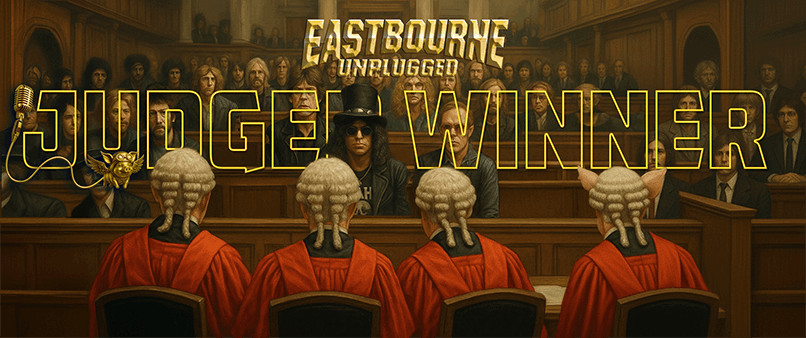

Congratulations to Finn Anderson Budd — winner of Eastbourne Unplugged 2025 with his lyrics
Fair Shot!
A Year 7 at Muritai, Finn has already proven himself a writer with bite — his rap words are bold, honest, and straight from the heart. A powerful voice on the page, showing us that the youngest pens can carry the biggest punch.
Well done, Finn — Eastbourne is proud!
October, 2025/ Wellington
• Oversupply: Four agencies is unjustifiable.
• Future likely: At best, one boutique office. At worst (for them), none at all — because in the 21st century, real estate is a dying industry. Trade Me already sells the houses, and AI could do the contracts. The only thing holding on is ego, not necessity.
• Community opportunity: A flat-fee, co-op style model could replace the shopfronts entirely, keeping wealth local and turning Eastbourne into a test case for a smarter, leaner, 21st-century village.
MEGA’s Radical Redevelopment Plan:
Enough is enough. Here’s what Eastbourne could look like if we stopped wasting prime shopfronts on a fading industry:
• Agency #1 stays open (so they can keep competing over who has the shinier Lexus and the bigger window display).
• Agency #2 becomes a hardware/DIY store — because it’s 2025 and we still have to drive to Lower Hutt for screws and nails.
• Agency #3 turns into an ice cream parlour + gift shop to sweeten the ferry crowds and actually give visitors something to buy.
• Agency #4 transforms into a cinema/live music venue — so locals finally have somewhere to go after 8pm.
Why This Matters.
Real estate in Eastbourne isn’t a growth industry, it’s a zombie one. AI could already do the work: virtual tours, instant valuations, and robots showing you around the open home while telling you the bathroom is “sun-filled” (it isn’t).
Houses will still sell (because: Trade Me). Locals will still have a friendly agent to argue with. But the village will also gain the services it actually needs to survive.
MEGA Verdict:
It’s time to trade four tired real estate shopfronts for things we can eat, wear, hammer into a wall, or dance to after dark. Because the future of real estate isn’t glossy portraits in Eastbourne windows — it’s algorithms and robots. And we may as well admit it.
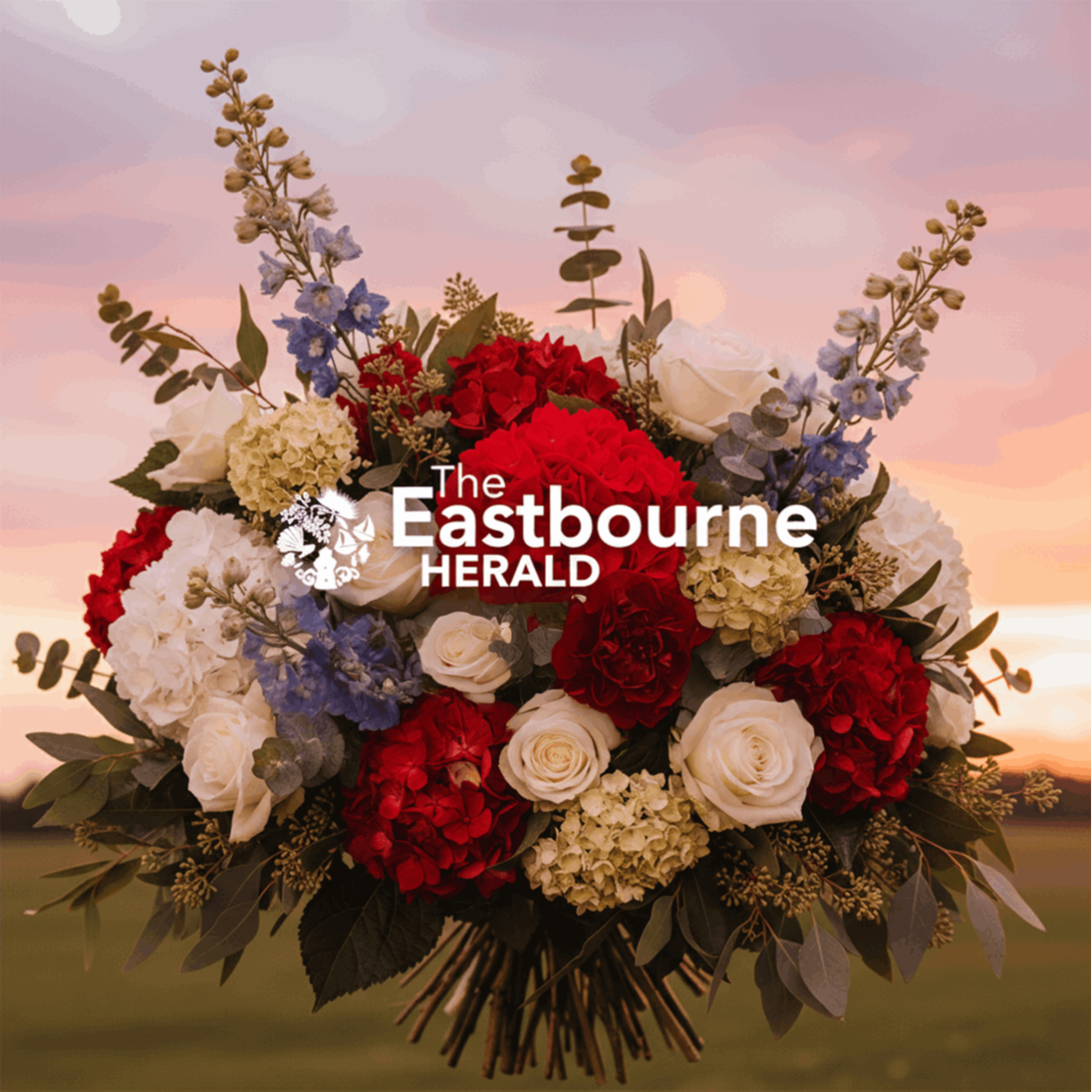
Farewell to Louise — and a Challenge to the Bays
Eighteen years at the helm of The Eastbourne Herald is no small feat — it’s practically a lifetime in newspaper years. Louise Parry hasn’t just edited a paper; she’s kept the pulse of this village beating, issue after issue, deadline after deadline. In a world where local voices are being swallowed by algorithms and “content,” she gave Eastbourne something rare — a sense of itself.
Now the baton passes to Nicola Morris, and with it, the challenge of keeping The Herald alive in an age when print is treated like an endangered species. The truth? It is — unless locals fight for it. A community paper only survives when the community shows up: by reading, writing, advertising, and reminding the world that Eastbourne is more than a hashtag.
So here’s the MEGA view: support your Herald or lose it. Buy an ad, pitch a story, share your photos, tell your truths. Because once the ink stops flowing, so does the heartbeat of the village.
Louise, you made it matter. Nicola — make it roar.
October, 2025/ Wellington
Once upon a time, journalism in New Zealand meant facts first, opinions second, and trust earned the hard way — with shoe leather, tape recorders, and editors who threw your copy back if it wasn’t watertight.
Today, we get something else: presenters performing empathy, political reporters auditioning for sainthood, and a national media scene so frightened of offending anyone that it’s offended everyone.
The Age of the Over-Indulgent and the Under-Informed
Turn on TVNZ 1 or Newshub and you’ll see the new formula: a sugary blend of identity indulgence, over-produced emotion, and soft-focus storytelling. The daily news has become a mirror, not a lens — constantly reflecting back what audiences already feel rather than what they might need to know.
The treatment of Māori issues is a perfect case study. Instead of measured reporting or courageous scrutiny, we get patronising over-compensation — a form of national guilt therapy masquerading as journalism. Cultural awareness is one thing; political indulgence is another. When every story must prove its virtue before it earns airtime, truth quietly leaves the room.
Bias, Branding, and the Death of Doubt
An independent review of TVNZ’s newsroom recently claimed there was “no systemic bias,” which is a bit like saying a ship isn’t sinking — it’s just very wet below deck.
The bias is cultural, not conspiratorial. It’s the bias of sameness: the same social circles, the same Twitter feeds, the same university lectures that taught young reporters that “balance” is an outdated colonial relic.
TV3, under the glossy Warner Bros. Discovery umbrella, suffers a different disease — the commercial compulsion to dramatise everything. Every story must be “urgent,” “heartbreaking,” or “explosive.” What we lose in nuance, we gain in hashtags. It’s the old ratings game disguised as moral purpose.
When Journalists Became Influencers
Both major networks have blurred the line between reporting and performance. Anchors emote. Reporters opine. “Analysis” is served like dessert before the meal.
Opinion columns bleed into news bulletins, and editorial direction has replaced editorial discipline. The old-school investigative journalist — the one who spent six months buried in files before writing a single line — has been replaced by the “stand-up” correspondent who files three stories a day and tweets between live crosses.
The watchdog has learned to wag its tail.
The Silence Spreading Beneath
As Gavin Ellis warned, New Zealand’s “news deserts” are already forming. Forty local mastheads gone in seven years. No one left to cover the council meeting, the prize-giving, or the pothole that’s swallowed half of Ferry Road.
When the small newsrooms die, the big ones don’t fill the gap — they simply turn up once a crisis hits, cameras rolling, empathy pre-loaded. The daily rhythm of community life goes unrecorded. Democracy rots quietly, not in scandal but in silence.
Uncomfortable Truths
Tracy Watkins was right about one thing: journalism’s job isn’t to soothe, it’s to confront. But “uncomfortable journalism” requires the courage to be unpopular — something that’s gone missing in a landscape addicted to applause.
Our media no longer risk discomfort; they manage it. They talk endlessly about “trust” while curating everything that might endanger it. The result is news that feels safe, sanitised, and somehow smug — the journalistic equivalent of tofu.
Reclaiming the Craft
What New Zealand needs isn’t more funding announcements or diversity audits. It needs editors who can still say “prove it.” It needs reporters who know how to dig, not just download. It needs regional newsrooms restored to life before they vanish completely.
Above all, it needs a press that remembers its role is not to belong to anyone — not to government, not to advertisers, not to ideology, and certainly not to social media mobs.
Until that happens, we’ll keep mistaking noise for news, performance for truth, and comfort for credibility.
And when the last local paper finally dies, don’t be surprised if the obituary comes with a government logo on top.
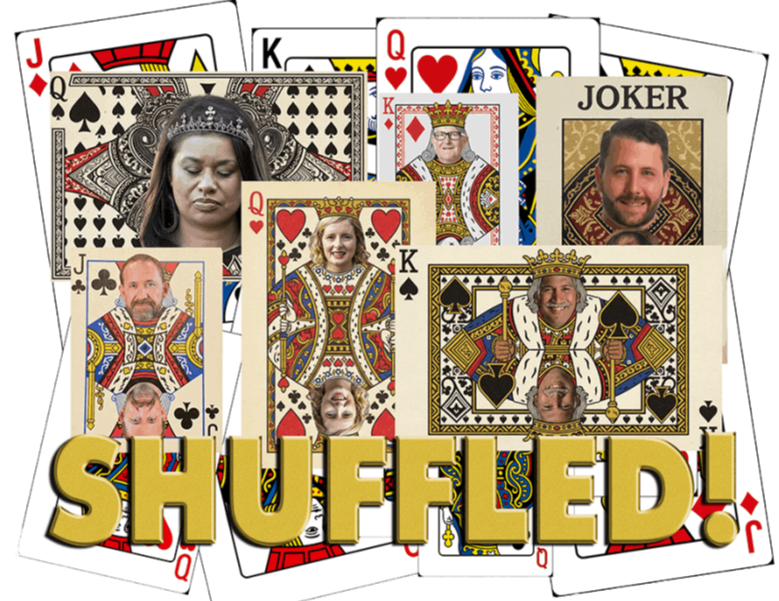
Finally, some movement.
Tory’s gone, Barry’s gone, and old fossil Guppy has finally been prised off his mayoral chair in Upper Hutt after nearly a quarter of a century. The region just got a long-overdue hose down.
Wellington: Andrew Little’s in, Labour’s machine has rebooted, and for the first time in years the city might actually fix a pipe instead of just commissioning a report about it. The left’s got the numbers—now it needs delivery, not diversity panels.
Lower Hutt: Ken Laban takes over from Campbell Barry. Big shoes? Hardly. The city’s broke, the water bills are coming, and it’s time to swap slogans for spreadsheets.
Upper Hutt: Peri Zee’s arrival ends Guppy’s Jurassic reign. Transparency and daylight at last—no more decisions in back rooms that smell of instant coffee and the 1990s.
The real story: Turnout still pitiful. Barely a third of locals bothered to vote, proving once again that most people don’t believe councils matter until the sewage hits the sea.
MEGA Verdict: Some new faces, same old pipes. Don’t pop the champagne yet—but at least the fossils, flounderers, and flukes are finally out of the tank.
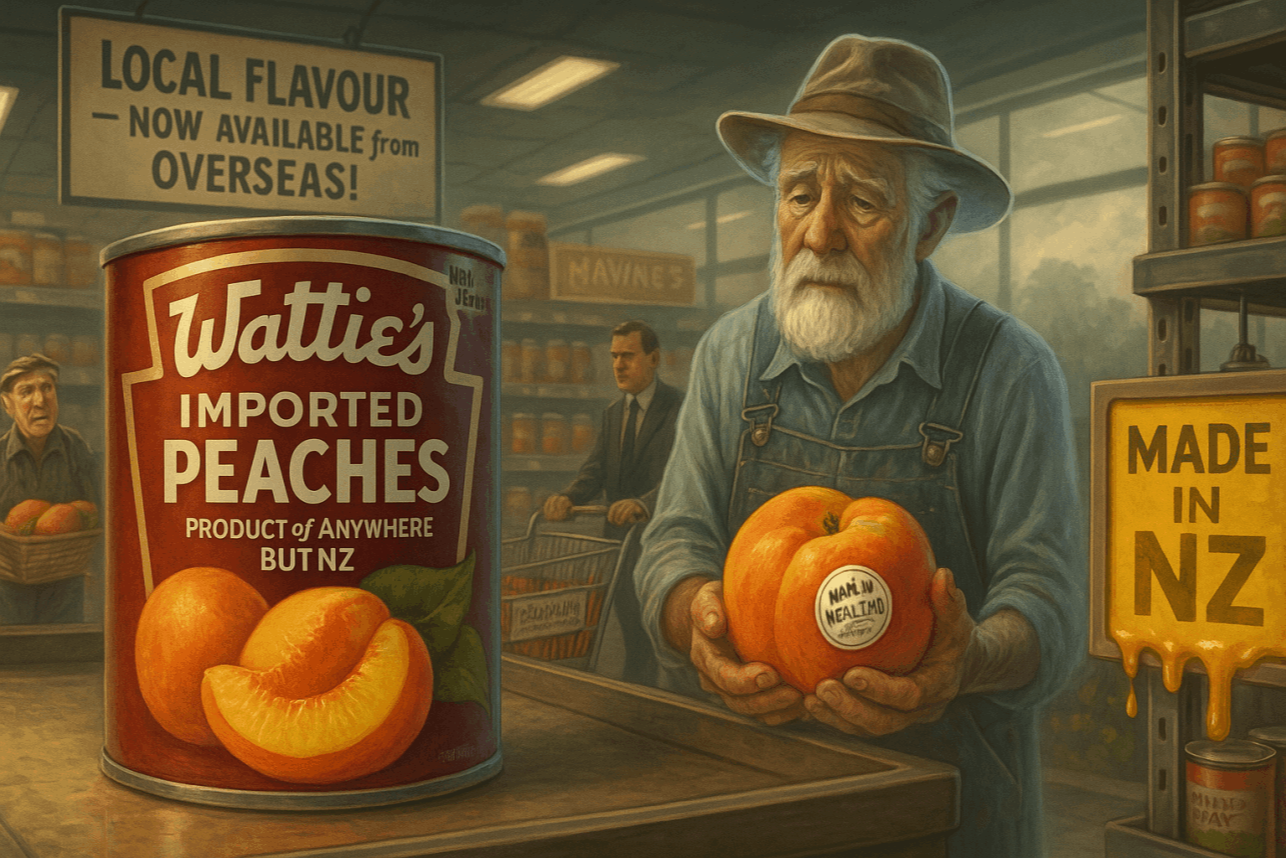
Wattie’s Cans the Kiwi Peach
Once upon a time, Wattie’s was the pride of Hastings — Jim Wattie’s smiling face was practically stamped on the national pantry. Fast-forward to 2025 and the company, now a cog in the Kraft Heinz machine, is quietly telling growers: “Sorry mate, keep your peaches — we’re shopping overseas.”
Yes, the same Wattie’s that built an empire on New Zealand orchards is now looking at South African apricots, Peruvian asparagus… and, apparently, foreign peaches. Hawke’s Bay growers are left holding the fuzz while the profits head offshore.
Summerfruit NZ calls it a “concern.” We call it a corporate pit in the fruit bowl. Orchardists invest for decades, not for a shrug from a multinational that changes recipes the way it changes CEOs.
The solution? Don’t swallow it. Literally. Next time you’re in the supermarket, look for the label. If it’s not Kiwi fruit inside, leave it to rot on the shelf. Kraft Heinz doesn’t want our peaches? Fine — but they can choke on their own imported syrup.
Vote with your wallet. Buy New Zealand peaches. Or get used to telling your kids Wattie’s was once ours, before it canned us too.
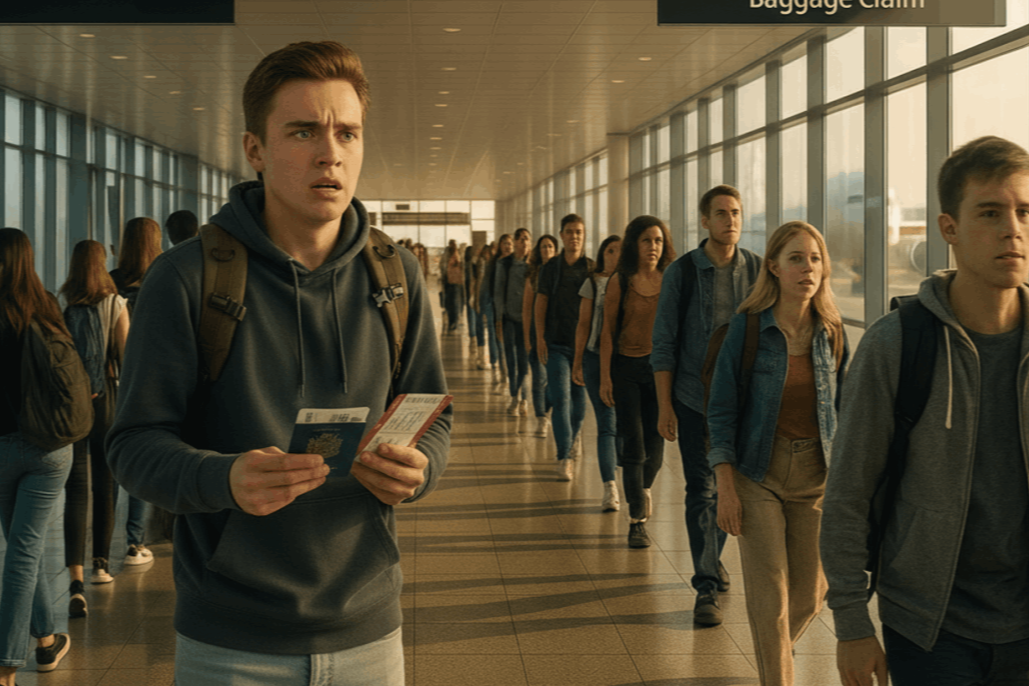
Broken or Brilliant? Depends Which Glass You’re Holding
Is New Zealand broken? Columnists say yes, economists say “brutal,” and young people are waving their passports at Australia like it’s the last chopper out of Saigon.
The numbers sting: wages lag $20k behind the Aussies, houses still hover around a million, and unemployment just hit a five-year high. For anyone under 30, the property ladder looks less like a ladder and more like a cliff face.
And yet… NZ still ranks among the happiest, cleanest, least-corrupt, most liveable countries on the planet. Seventy-seven percent of us still say life here is “good to excellent.” That’s not broken — that’s just cracked porcelain.
So is New Zealand a wreck to escape from, or a gem worth holding on to? Truth is, it’s both. Broken dreams for some, brilliant sunsets for others. The real question isn’t “Is NZ broken?” — it’s “Which glass are you drinking from?”
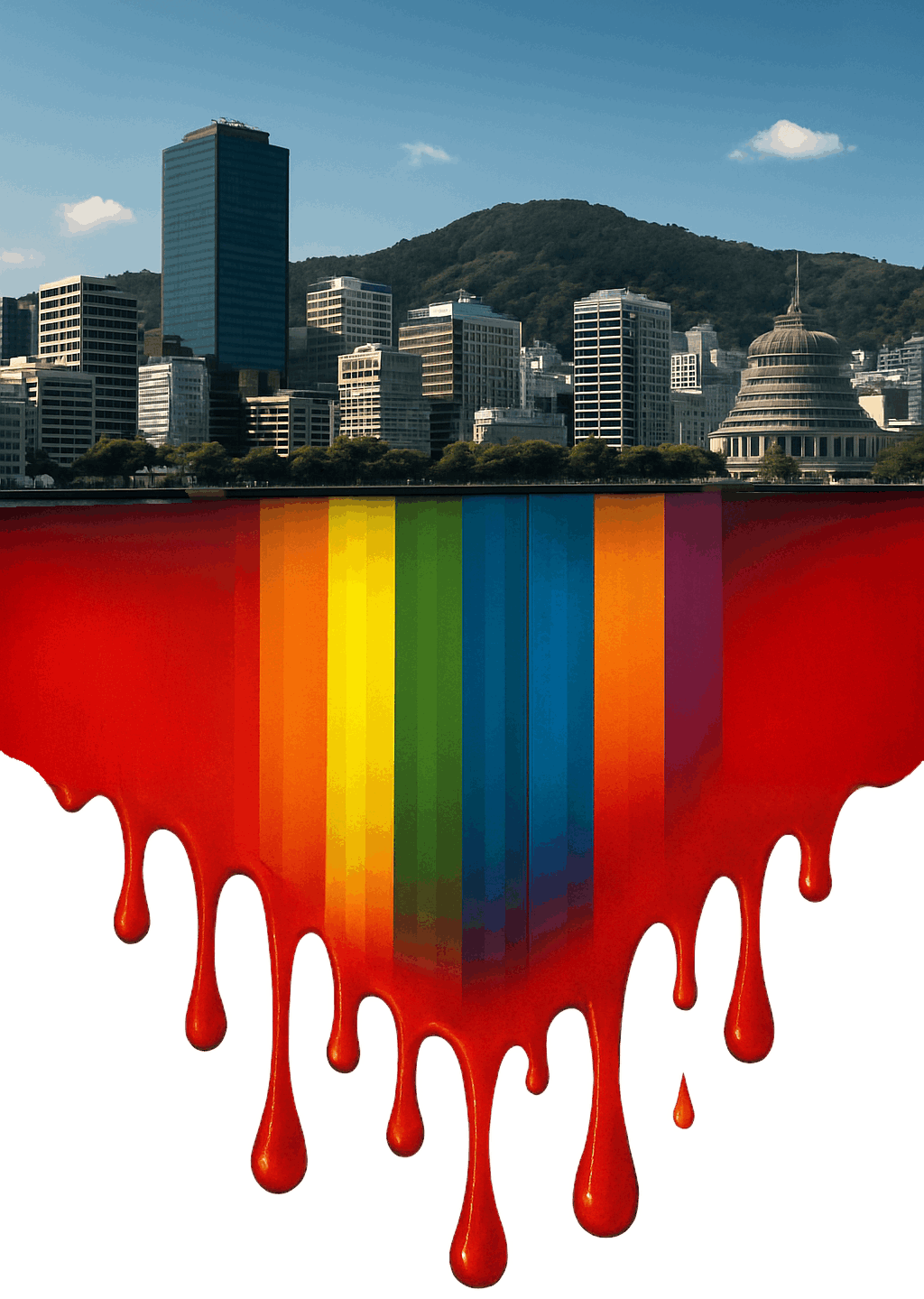
When Inclusion Becomes an Industry
Wellington has declared itself the queerest city in New Zealand. With 11.3 percent of its population identifying as part of the Rainbow community — double the national rate — the council is now preparing to adopt a full Rainbow Action Plan.
It promises gender-inclusive facilities, housing initiatives, staff training, and a greater public presence for the Rainbow community. The intention is noble: safety, visibility, and equality. Yet behind the good intentions lies a familiar Wellington habit — turning something natural into a bureaucratic enterprise.
No one disputes the right to live, work, and love freely. That’s already the social norm in this city. But the more we highlight difference, the more we risk reinforcing it.
True inclusion happens quietly — when people simply belong, without needing a label or a policy to prove it.
Wellington has always been tolerant. It didn’t need a Rainbow Plan to be open-minded; it just was. The cafés, arts scene, and workplaces already reflect diversity as part of everyday life. So why now a separate framework for something the city had already embraced organically?
When difference becomes a department, belonging turns into paperwork.
Equality stops being lived experience and becomes a managed identity.
The council’s own research points to real issues — safety concerns, discrimination, unequal access to housing — and those deserve serious focus. But that’s achieved by embedding fairness across everything, not carving out new bureaucratic lanes. You don’t unite a city by segmenting it.
Normalisation is more powerful than celebration.
When someone can walk through the city, live, love, and work without the need for a rainbow banner or dedicated strategy — that’s genuine equality.
Wellington’s heart has always been inclusive. The challenge now is to keep it that way — not by amplifying difference, but by making it irrelevant.
In the end, the goal shouldn’t be a Rainbow City.
It should be a city where everyone simply fits in — without needing a plan to do so.

Missiles, Marching, and a Trump Cameo
China’s 80th-anniversary WWII parade had everything: goose-stepping soldiers, tanks polished shinier than a K-pop idol, and hypersonic missiles paraded like contestants in Miss World Domination 2025. Authoritarian leaders filled the front row like it was Coachella for dictators.
But the star turn didn’t come from Beijing — it came from Donald J. Trump. Watching from afar, he called it a “beautiful ceremony,” then complained China forgot to thank the U.S. for “helping very, very much” in WWII. He even sent his “warmest regards” to Putin and Kim Jong Un — because nothing says international diplomacy like a shout-out to the villain table at Comic-Con.
The whole thing felt less like a parade and more like a movie trailer: World Power II — Revenge of the Multipolar Order. Xi directed, Putin produced, Kim handled the snacks, and Trump popped in to remind everyone he once owned the rights to “Make Parades Great Again.”
Some saw military might. We saw missiles strutting like boy-band members, while Trump heckled from the sidelines demanding they play his song next.
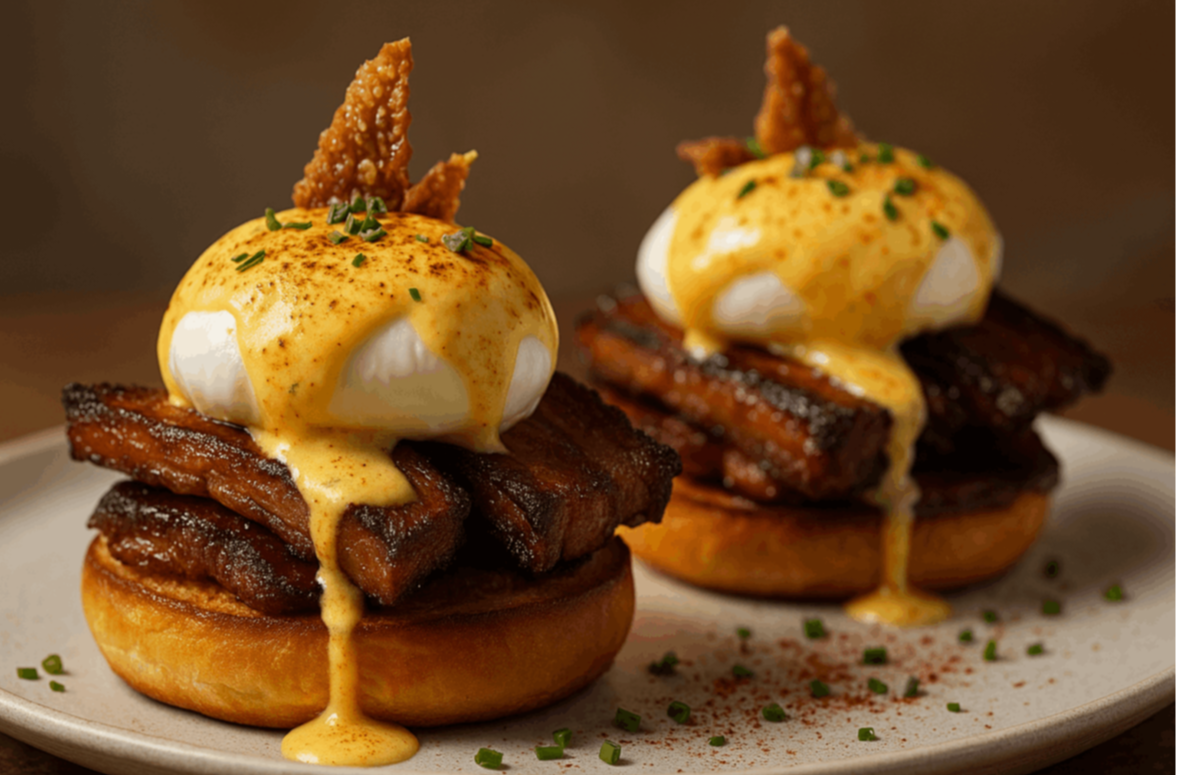
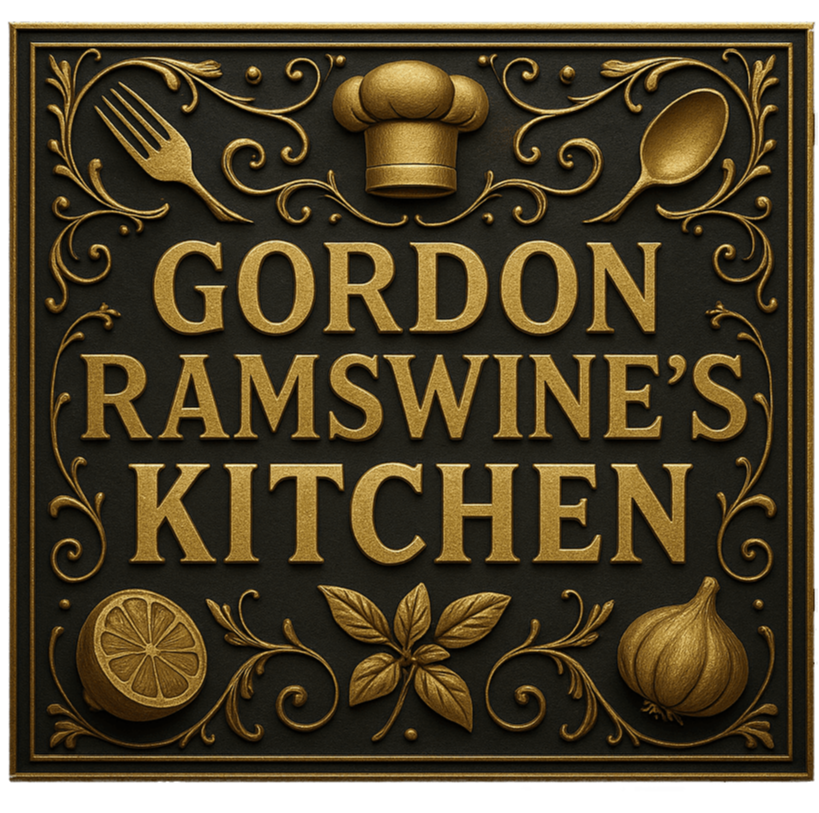
October 2025 Recipe
A decadent twist on the classic Eggs Benedict.
Stacked tall, drizzled generously, and plated with a sly grin — because restraint has no place at brunch.
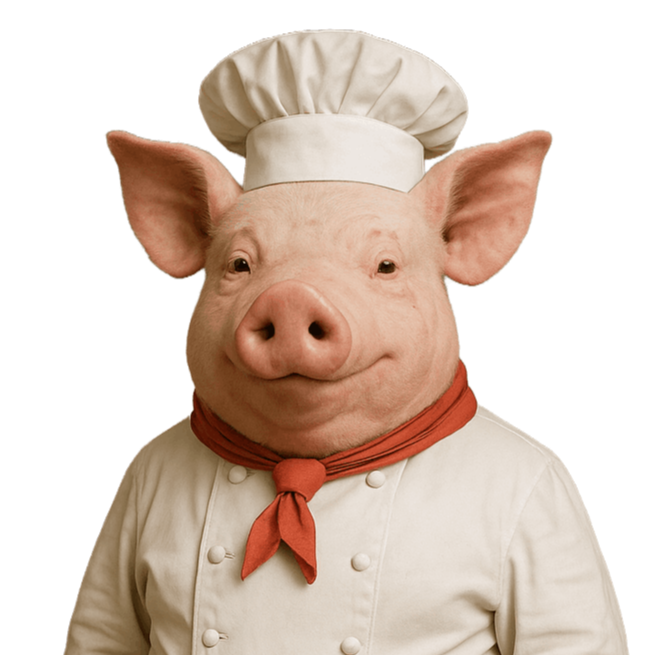
Forever Porker
The pig with a palate sharper than his tongue. Known for turning slop into haute cuisine and never holding back on a fiery snort of criticism, Ramswine runs the kitchen like a battlefield. His signature dishes? Swine-dine perfection, seasoned with equal parts brilliance and barnyard bite.
The Hogfather follows the rise of a powerful porcine patriarch who builds an empire from the mud up. When rival families threaten his sty, betrayal simmers and vendettas sharpen like butcher’s knives. It’s a saga of loyalty, greed, and bacon-wrapped revenge.
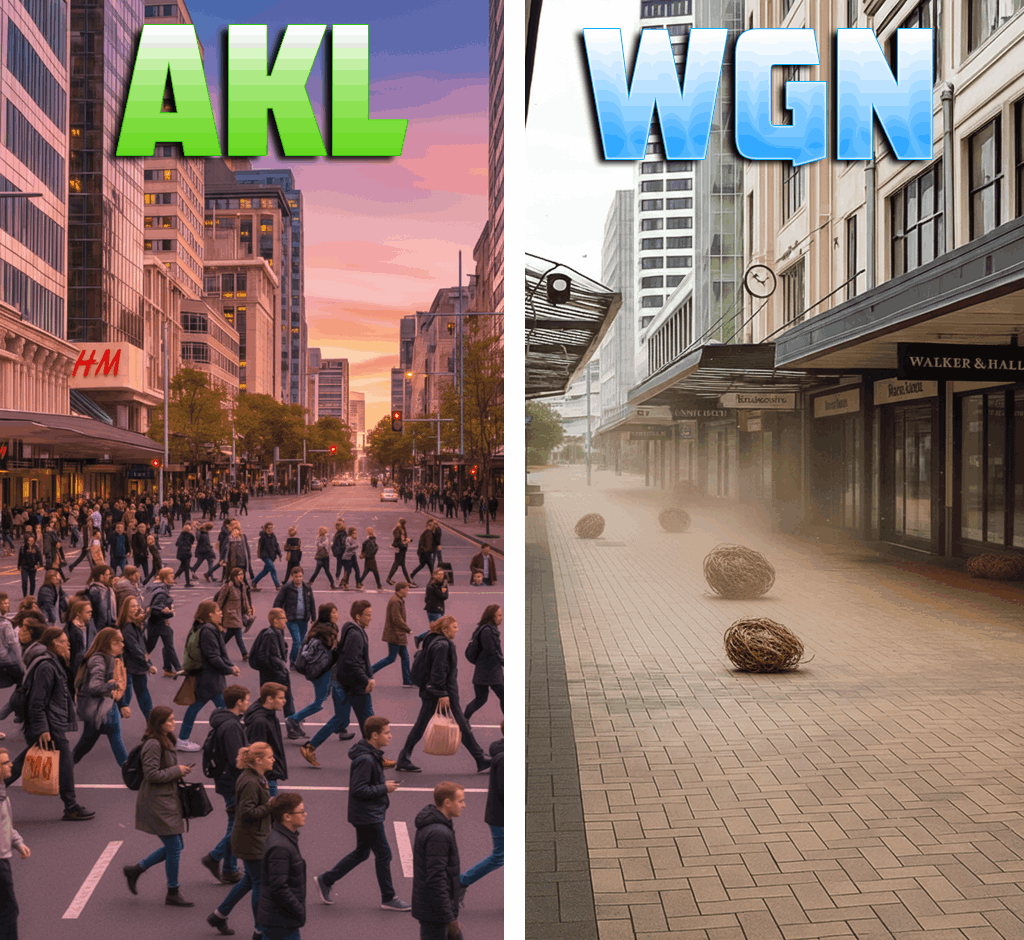
Welcome to the Mile That Lost Its Shine
Once upon a time, Lambton Quay was the catwalk of the capital — suits in motion, shop windows gleaming, cash registers clicking like cicadas in summer.
Now? It’s a fashion graveyard with a coffee addiction. The only queues left are for flat whites, not fitting rooms.
Wellington City Council, bless their visionary hearts, think they can fix this with new paving, fewer cars, and a few dozen consultation meetings about “placemaking.”
They call it the Golden Mile Revamp. But from here, it looks more like a long walk to nowhere — beautifully landscaped, tastefully lit, and economically pointless.
Auckland Eats Wellington’s Lunch (and Dinner)
Up north, Auckland’s Queen Street hums with retail energy — global brands, local designers, high-spending visitors, and an after-work economy that actually exists.
Meanwhile in Wellington, even the pigeons are on recess.
Vanessa Rader from Ray White’s research team summed it up neatly:
“Even Lambton Quay, Wellington’s premium retail street, cannot match Auckland’s luxury concentration, while the remainder of the Golden Mile offers no luxury retail presence whatsoever.”
Translation: The capital’s crown jewel is cubic zirconia.
From Golden to Rusted
The once-mighty Golden Mile is now a bronze corridor of bubble tea, boarded-up boutiques, and bewildered bureaucrats.
Courtenay Place, once the social artery of the city, is now better known for cones, closures, and the occasional scooter accident.
The council’s big idea? Remove parking and “activate” spaces with planters and murals. Because nothing says “thriving retail environment” like a $5 latte beside an empty shop window.
Death by Consultation
Let’s be honest: Wellington could run an entire economy on “engagement.”
Every lamppost has a survey. Every decision has a draft strategy.
By the time the next consultation round begins, half the businesses they’re consulting are gone.
And yet, the answer is staring us in the cracked shopfront: people shop where life exists. Not where cycleways glitter and access vanishes.
A Mile in Someone Else’s Shoes
Auckland has its faults — ego being one of them — but it knows that retail follows money, movement, and momentum.
Wellington, on the other hand, seems to think retail will come back for the vibe.
It won’t. Not until there’s a reason to come to town that doesn’t involve an orange cone or a protest march.
Even the city’s own workers barely venture out anymore. The public sector’s hybrid work model means Fridays are ghost days — tumbleweeds and takeaway cups.
The Real Golden Question
Maybe it’s time to stop calling it the Golden Mile altogether.
Until someone walks down it with shopping bags in hand, it’s The Bronze Trudge.
A retail strategy designed by people who’d rather be at a workshop than a store.
MEGA Verdict
Wellington doesn’t need more planners. It needs people.
Real, breathing, spending people.
And you don’t attract them with another cycleway — you do it by making the city worth visiting again.
Until then, the only thing golden about the Mile will be the colour of the traffic cones.
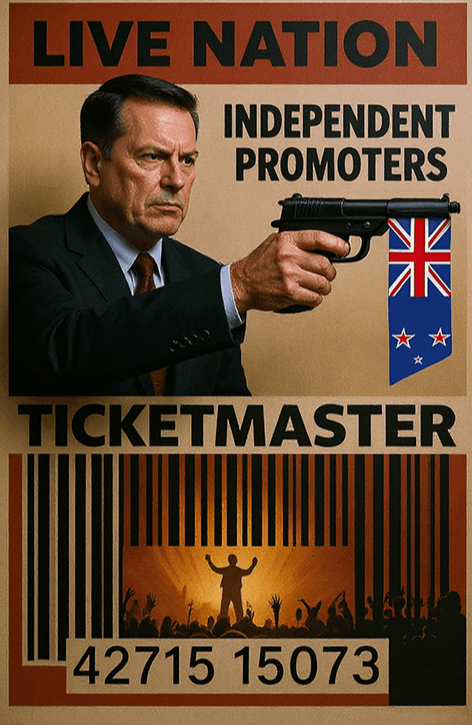
New Zealand’s live entertainment scene looks free and local on the surface — but scratch the paint and you’ll find the same American fingerprints running through the circuits, from Spark Arena to the smallest “Ticketmaster-exclusive” theatre seat in town.
The Illusion of Choice
Ticketmaster doesn’t own these venues — it owns access. The difference is semantic, not practical. When you control the digital box office, you control who walks through the door. Promoters without Live Nation ties are quietly suffocated: can’t book the venue, can’t access the presale database, can’t get the act.
Independent promoters are effectively held at gunpoint by a barcode, forced to use Ticketmaster if they want into any of the major New Zealand venues. That’s not partnership; that’s a monopoly wrapped in a smiling app icon.
The Spark Arena Effect
Take Auckland’s Spark Arena. On paper it’s managed by QPAM and EVENZ — but trace the financial veins and they lead straight back to Live Nation’s global body. Spark is more than a venue; it’s a listening post. Every competitor’s tour, audience data, pricing, and presale strategy flows through a system owned by the same corporate giant competing against them. Imagine Woolworths running the checkout counters at New World — that’s the absurdity of it.
Local Voices, Global Profits
Live Nation’s ownership is American, and its loyalty is to shareholders, not communities. The NZ public is a data pool, not an audience. Every ticket sold, every “dynamic price” surge, every VIP package — it’s money leaving the country. Compassion doesn’t feature on the balance sheet.
Meanwhile, Kiwi promoters — those who built their reputations on trust, fair prices, and local acts — find themselves slowly erased. The ladder they climbed is being kicked away one ticketing contract at a time.
The Cultural Cost
What’s at stake isn’t just market share — it’s cultural sovereignty. When a single offshore conglomerate dictates who gets a stage, who sets the price, and who sees the numbers, creativity becomes commerce and risk-taking dies. New Zealand ends up with a “safe” circuit of globally approved acts while local innovation struggles to pay for rehearsal space.
The MEGA Verdict
Live Nation and Ticketmaster have built a velvet-gloved monopoly: legally sound, morally hollow. New Zealand entertainment has become a franchise of a global entertainment cartel.
If we don’t defend our stages now, they’ll be rented back to us — at dynamic pricing.
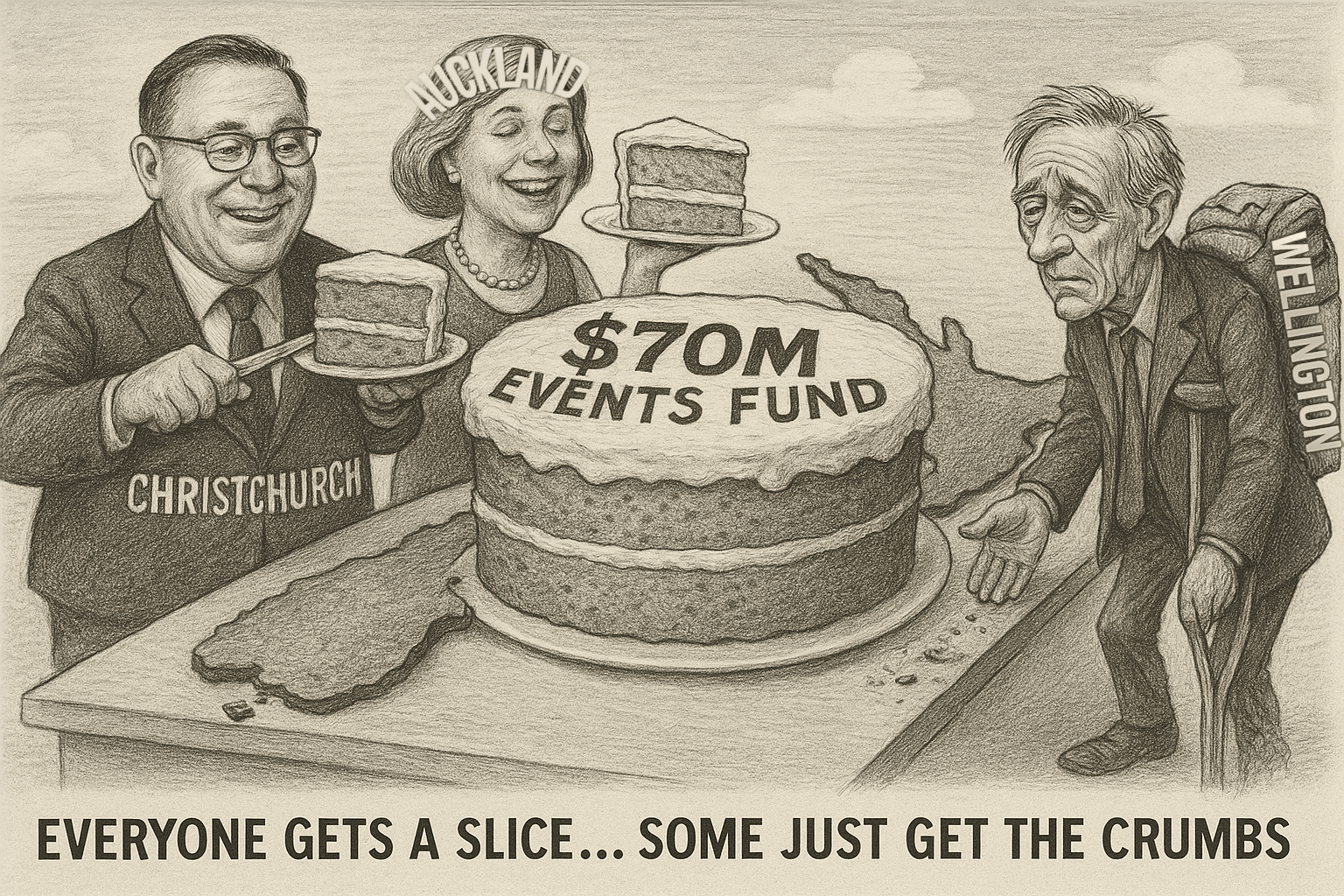
MEGA News | October 2025
The Government’s $70M events fund was baked as a cake for the whole country — but Auckland and Christchurch are already carving up the fat slices.
And Wellington? Left hunched at the table, fighting for crumbs.
Once the cultural heartbeat of New Zealand, the capital now gets buskers while the big cities book Beyoncé. Everyone gets a slice, but some slices are a banquet — and ours barely feeds the pigeons.
MEGA says: If Wellington doesn’t demand its share now, soon there won’t even be crumbs to sweep up.
We’re not a political party—just a bunch of locals with a low tolerance for waffle and a high tolerance for mischief. MEGA is part neighbourhood fix-it crew, part satire squad, and part spontaneous parade.
No jargon. No committees. Just Eastbourne, steering its own ship—with a kazoo in one hand and a to-do list in the other.
For the full MEGA experience, visit our website on something bigger than your phone.
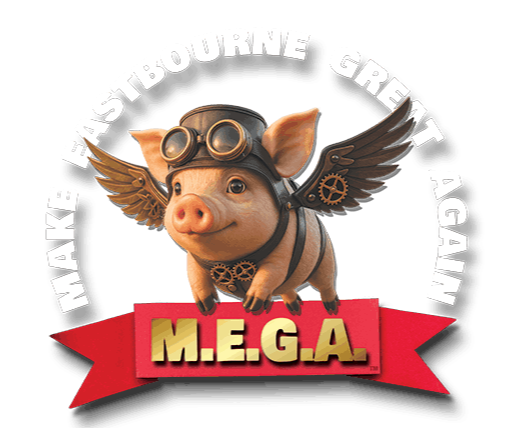
© Copyright 2025 M.E.G.A. - All Rights Reserved - Make Eastbourne Great Again Inc.
Join the MEGA-VERSE:
The MEGA Management & Crew is looking for more members to join our organisation.
Also Join our Facebook Group [ icon click on the right ] and contribute to the conversation.
It's Free. No Censorship. No Judgement (almost).
Help us Make the MEGA-VERSE Even Bigger Than It Is Already.